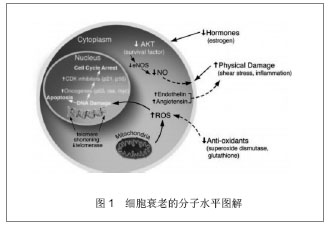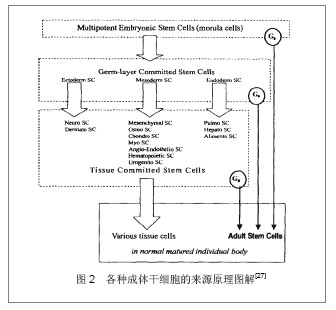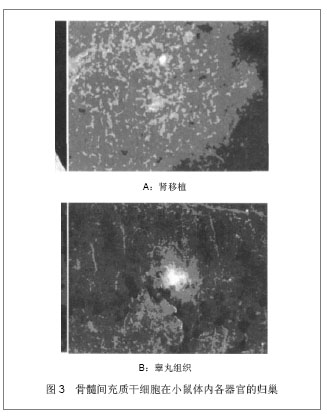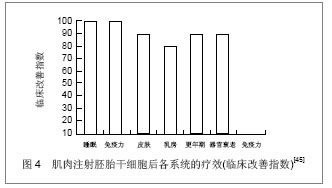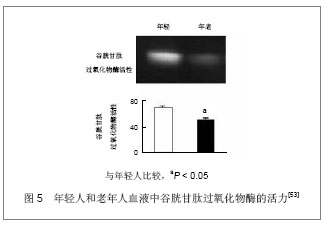| [1]张建,华琦.我国人口老龄化现状及其应对策略[J].中国健康管理杂志,2009,3(3):135-137.[2]Meeks WM. Pathophysiology of hypertension in the elderly. Semin Nephrol. 2002;22(1):65-70.[3]Stanzione P, Tropepi D. Drugs and clinical trials in neurode- generative diseases. Ann Ist Super Sanita. 2011;47(1):49-54.[4]Baker DJ, Wijshake T, Tchkonia T,et al. Clearance of p16Ink4a-positive senescent cells delays ageing-associated disorders. Nature. 2011;479(7372):232-236.[5]Krishnamurthy J, Torrice C, Ramsey MR, et al. Ink4a/Arf expression is a biomarker of aging. J Clin Invest. 2004; 114(9):1299-1307.[6]Marchand A, Atassi F, Gaaya A, et al. The Wnt/beta-catenin pathway is activated during advanced arterial aging in humans. Aging Cell. 2011;10(2):220-232.[7]Liu S, Liu S, Wang X, et al. The PI3K-Akt pathway inhibits senescence and promotes self-renewal of human skin-derived precursors in vitro. Aging Cell. 2011;10(4): 661-674.[8]Kloet DE, Burgering BM. The PKB/FOXO switch in aging and cancer. Biochim Biophys Acta. 2011;1813(11):1926-1937.[9]Langley E, Pearson M, Faretta M,et al. Human SIR2 deacetylates p53 and antagonizes PML/p53-induced cellular senescence. EMBO J. 2002;21(10):2383-2396.[10]Turnheim K.When drug therapy gets old: pharmacokinetics and pharmacodynamics in the elderly. Exp Gerontol. 2003; 38(8):843-853.[11]Sinclair DA, Lin SJ, Guarente L. Life-span extension in yeast. Science. 2006;312(5771):195-197.[12]Dhahbi JM, Kim HJ, Mote PL, et al. Temporal linkage between the phenotypic and genomic responses to caloric restriction. Proc Natl Acad Sci U S A. 2004;101(15):5524-5529.[13]Xu JX. Differentiation of Constituional Isomer of 2, 2a, 3, 4-Tetrahydro- 4-methyl-2a-phenyl-2-(thiophen-2-yl)- 1H-azeto[2,1-d][ 1,5]benzothiazepin-1-one-5-oxide and Fragmentations of 2,3-Dihydro-2,4-diphenyl-1, 5-benzothiazepine-1-oxide/-1,1-dioxide. Chemical Research in Chinese Universities. 2005;3:274-279.[14]韩晓琳,张宗玉,童坦君.衰老过程中原癌基因及抑癌基因的表达谱[J].生理科学进展, 2002,33(2):126- 130.[15]Zhao L, Tong T, Zhang Z. Expression of the Leo1-like domain of replicative senescence down-regulated Leo1-like (RDL) protein promotes senescence of 2BS fibroblasts. FASEB J. 2005;19(6):521-532.[16]Guo S, Zhang Z, Tong T. Cloning and characterization of cellular senescence-associated genes in human fibroblasts by suppression subtractive hybridization. Exp Cell Res. 2004; 298(2):465-472.[17]Harman D.Aging: a theory based on free radical and radiation chemistry. J Gerontol. 1956;11(3):298-300.[18]Shi Y, Camici GG, Lüscher TF. Cardiovascular determinants of life span. Pflugers Arch. 2010;459(2):315-324.[19]Ballard VL, Edelberg JM. Stem cells and the regeneration of the aging cardiovascular system. Circ Res. 2007;100(8): 1116-1127.[20]Quevedo C, Alcázar A, Salinas M.Two different signal transduction pathways are implicated in the regulation of initiation factor 2B activity in insulin-like growth factor-1-stimulated neuronal cells. J Biol Chem. 2000;275 (25):19192-19197.[21]Lin PC, Chiou TW, Liu PY, et al. Food supplement 20070721-GX may increase CD34+ stem cells and telomerase activity. J Biomed Biotechnol. 2012;2012:498051.[22]Tarazona R, Solana R, Ouyang Q,et al. Basic biology and clinical impact of immunosenescence. Exp Gerontol. 2002; 37(2-3):183-189.[23]胡寒春,邓云龙,范华,等.中老年人衰老自评问卷的初步编制[J].中国临床心理学杂志,2010,18(1):18-20.[24]Weissman IL, Baltimore D. Disappearing stem cells, disappearing science. Science. 2001;292(5517):601.[25]王琪,方向东,戚正武.干细胞的研究进展[J].细胞与分子免疫学杂志,2001,17(1):91-94.[26]张刚庆,方驰华.干细胞研究的问题与对策[J].世界华人消化杂志, 2003,11(12): 2011-2014.[27]唐佩弦. 我国造血干细胞基础研究的新进展兼论干细胞可塑性[J].中国实验血液学杂志, 2003,11(1):1-6.[28]高景恒,袁继龙,王洁晴,等.脂肪来源干细胞与延缓衰老[J].中国美容整形外科杂志, 2011,22(11): 688-691.[29]韩忠朝.干细胞:人类治病健体抗衰老的希望[J].天津科技, 2000 (6):150-165.[30]Ebisawa K, Kagami H, Kato R,et al. Regenerative medicine for anti-aging. Nihon Rinsho. 2009;67(7):1402-1406.[31]李艳菊,胡亮杉,郭坤元. 骨髓间充质干细胞回输对大鼠肾脏衰老的影响[J].中华肾脏病杂志,2009,25(3):241- 242.[32]Li YJ, Deng L, Huang R, et al. The effects of mesenchymal stem cells on the aging kidneys in rats. Zhonghua Nei Ke Za Zhi. 2009;48(6):458-461.[33]Cardoso AA, Li ML, Batard P,et al. Release from quiescence of CD34+ CD38- human umbilical cord blood cells reveals their potentiality to engraft adults. Proc Natl Acad Sci U S A. 1993;90(18):8707-8711.[34]罗利民,布林.静脉输注对60Coγ射线照射小鼠脾脏细胞生物学效应的影响[J].中国组织工程研究与临床康复,2009,13(1): 145-147.[35]李春明,刘毅.脂肪干细胞及其在脂肪组织工程中的应用[J].中国美容医学, 2006,15(4): 466-468.[36]杨春,李东飞,戴景兴,等. 异体脂肪源干细胞移植对大鼠的抗衰老作用[J].解剖学报,2010, 41(1):87-92.[37]Park BS, Jang KA, Sung JH, et al. Adipose-derived stem cells and their secretory factors as a promising therapy for skin aging. Dermatol Surg. 2008;34(10):1323-1326.[38]Song SY, Jung JE, Jeon YR, et al. Determination of adipose- derived stem cell application on photo-aged fibroblasts, based on paracrine function. Cytotherapy. 2011;13(3):378-384.[39]Kim WS, Park BS, Park SH, et al. Antiwrinkle effect of adipose-derived stem cell: activation of dermal fibroblast by secretory factors. J Dermatol Sci. 2009;53(2):96-102.[40]Oatley JM, Brinster RL. The germline stem cell niche unit in mammalian testes. Physiol Rev. 2012;92(2):577-595.[41]刘孟章,李庆昌,衣紫桐,等.生殖干细胞与衰老关系的研究(一)[J].现代中西医结合杂志,2002,11 (13):1231- 1232. [42]Silani V, Fogh I, Ratti A, et al. Stem cells in the treatment of amyotrophic lateral sclerosis (ALS). Amyotroph Lateral Scler Other Motor Neuron Disord. 2002;3(4):173-181.[43]Söderdahl G, Barkholt L, Hentschke P, et al. Liver transplantation followed by adjuvant nonmyeloablative hemopoietic stem cell transplantation for advanced primary liver cancer in humans. Transplantation. 2003;75(7):1061- 1066.[44]Conboy IM, Yousef H, Conboy MJ. Embryonic anti-aging niche. Aging (Albany NY). 2011;3(5):555-563.[45]牛翠霞.胚胎干细胞注射液的临床应用[C].武汉:第八届东南亚地区医学美容学术大会,2004.[46]Asahara T, Murohara T, Sullivan A, et al. Isolation of putative progenitor endothelial cells for angiogenesis.Science. 1997; 275(5302):964-947.[47]Miller-Kasprzak E, Jagodziński PP. Endothelial progenitor cells as a new agent contributing to vascular repair. Arch Immunol Ther Exp (Warsz). 2007;55(4):247-259.[48]Aoki J, Serruys PW, van Beusekom H, et al. Endothelial progenitor cell capture by stents coated with antibody against CD34: the HEALING-FIM (Healthy Endothelial Accelerated Lining Inhibits Neointimal Growth-First In Man) Registry. J Am Coll Cardiol. 2005;45(10):1574-1579.[49]Walter DH, Rittig K, Bahlmann FH,et al. Statin therapy accelerates reendothelialization: a novel effect involving mobilization and incorporation of bone marrow-derived endothelial progenitor cells. Circulation. 2002;105(25): 3017-3024.[50]Kobayashi K, Imanishi T, Akasaka T. Endothelial progenitor cell differentiation and senescence in an angiotensin II-infusion rat model. Hypertens Res. 2006;29(6):449-455.[51]Mikirova NA, Jackson JA, Hunninghake R, et al. Circulating endothelial progenitor cells: a new approach to anti-aging medicine. J Transl Med. 2009;7:106.[52]Klöpper J, Lindenmaier W, Fiedler U, et al. High efficient adenoviral-mediated VEGF and Ang-1 gene delivery into osteogenically differentiated human mesenchymal stem cells. Microvasc Res. 2008;75(1):83-90.[53]He T, Joyner MJ, Katusic ZS. Aging decreases expression and activity of glutathione peroxidase-1 in human endothelial progenitor cells. Microvasc Res. 2009;78(3):447-452. |
